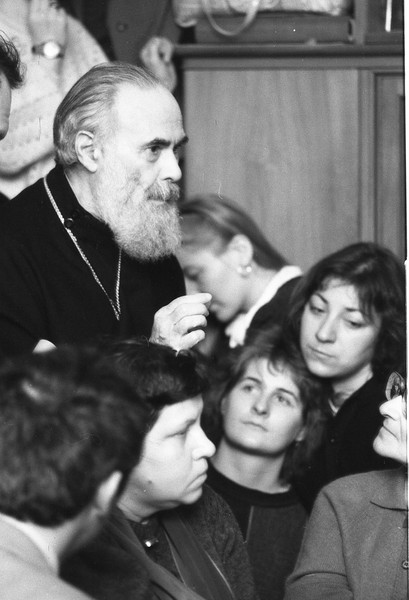Life and prayer are completely inseparable. A life without prayer is a life which is unaware of an essential dimension of existence. It is a flat life, without depth, a two-dimensional life in space and time. It is a life that is satisfied with the visible, with our neighbour, but with our physical neighbour, in whom we fail to discover the immensity and eternity of his destiny. The value of prayer consists in discovering, affirming and living in accordance with the fact that everything has a dimension of eternity and of boundlessness.
The world in which we live is not a profane world; it is a world which we know only too well how to profane, but in itself it comes from the hands of God, it is loved by God. The value which God attaches to it is the life and death of his Son, and prayer manifests our recognition of this fact, our discovery of the fact that in the eyes of God every person around us, every thing around us has a sacred value and, being loved by God, becomes precious to us. Not to pray is to leave God out of our existence, — not only God, but all that He signifies for the world He created, the world in which we live.
Now we often think that it is difficult to coordinate life and prayer. This is a complete mistake, resulting from a false idea of life as well as of prayer. We think that life consists of being on the move and that prayer consists in going off somewhere into retirement and for getting all about our neighbour and our human situation. This is untrue! It is a slander against life and a slander against prayer itself.
In order to understand prayer one must first get into solidarity with the whole reality of man, with his destiny and that of the whole world: assume it totally. And that is t essential act which God accomplishe’ in the Incarnation. This is the total aspect of what we call intercession. Ordinarily when we think of intercession we think that it consists of politely reminding God of what he has forgotten to do. Intercession consists of taking a step which brings us to the heart of tragic situations, — a step which has the same quality as the one taken by Christ, who became man once for all. It means stepping into the heart of situations from which we can never find our way out again; a Christian, Christ-like solidarity which is simultaneously oriented towards two opposite poles. Christ incarnate, true man and true God, has total solidarity with man in his sin when he turns towards God, and total solidarity with God when he turned towards man. It is this double solidarity which makes us in a sense a stranger to both sides and at the same time united with both sides. This is fundamentally our Christian situation.
You ask: “What shall we do?” Prayer arises from two sources: either from our wonder at God and the things of God — our neighbour and the world around us, in spite of its shadows; or else from the sense of tragedy, our own, and especially other people’s. Berdyaev said: “When I am hungry it is a physical fact; if my neighbour is hungry it is a moral fact.” That is the tragedy as it appears to us at every moment. My neighbour is always hungry: he is not always hungry for bread, he is sometimes hungry for a human gesture, a glance of affection. And this is where prayer begins, in this sensitization to the wonders and the tragedy. As long as this lasts, everything is easy: in wonder we pray easily, just as we pray easily when we are in the grip of a sense of tragedy.
But otherwise? At other times life and prayer must be made one. For instance, get up in the morning, stand before God and say: “Lord, bless me, and bless this day that is beginning”, and then treat the whole day as a gift of God and consider yourself as God’s envoy in this unknown which is the new day. This simply means something very difficult: that nothing which happens today will be alien to the will of God: everything without exception is a situation in which God will have placed you in order that you should be His presence, his love, his compassion, his creative intelligence, his courage… And on the other hand, every time you encounter a situation, you will be the one whom God has put there to perform the office of a Christian, to be a particle of the body of Christ and an action of God.
If you do that, you will easily see that at every moment you will have to turn to God and say: “Lord, clarify my intelligence, strengthen and direct my will, give me a heart of fire, help me.” At other moments you may say: “Thank you, Lord!” And if you are wise and know how to be thankful, you will avoid the folly that is called vanity or pride, which consists of imagining that one has done something that one could have left undone. It is God who has done it. It is God who has given us this marvelous gift of having that to do.
And when in the evening you present yourself again before God and make a quick examination of the day, you will be able to sing his praises, glorify Him, thank Him, weep over others and weep over yourself. If you begin to connect your prayer to life in this way, the two will never again be separated, and life will be like a fuel which at every moment is feeding a fire that becomes richer and richer, more and more burning, and which little by little will transform you yourself into that burning bush that is told about in Scripture.

















